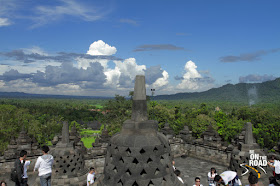
It ranks with Burma’s Bagan and Cambodia’s Angkor Wat as one of the greatest archaeological sites of South East Asia. It is Indonesia’s most visited tourist attraction. It is a UNESCO world heritage site. It is influenced by Mahayana Buddhism, indigenous Indonesia ancestor worship and Hinduism. It is the world’s largest Buddhist temple and a true work of marvel. I am talking about Indonesia’s famous Borobudur temple that is home to one of the largest and most complete ensembles of Buddhist reliefs in the world.

Built in the 9th century under the reign of the Sailendra dynasty, Borobudur is a giant of a temple. It consists of nine stacked platforms, six square and three circular, topped a central dome. It is decorated with 2,672 relief panels and 504 Buddha statues. Built using Javanese Buddhist temple architecture, this place for Buddhist pilgrimage is a treat to the eye and tells many stories.

The journey starts at the bottom of the massive temple and goes all the way to the top through stairways and corridors, each decorated with beautiful relief panels on its walls and balustrades. Out of the 9 floors, the bottom three represent desires, the middle three represent forms and the top three represent formlessness. And beyond these nine floors are the volcanoes of Merbabu and Merapi and the lush green cover in between. All making for a fantastic climb to the top of Borobudur.

This journey through the city of Buddhas tells you many stories – Buddha’s past lives, Buddha’s path to enlightenment, the birth of Buddha, the jatakas and avadanas, the law of Karma, the three realms of Buddhist cosmology, the 6 different postures of Buddha and more. These stories can be seen through the wall reliefs that adorn this nine floored temple. It is best to go in the company of a knowledgeable guide in case you wish to understand the wall reliefs completely.

Everything about Borobudur’s epic proportions scream awesomeness. It is built as a single large stupa, but when looked from the top, it looks like a giant tantric Buddhist mandala. The bell shaped stupas that adorn this monument at each of its floors are designed using ancient megalithic traditions incorporated with Mahayana Buddhist ideas and symbolism.

The entire monument was laid without mortar and it stands tall today due to its knobs, indentations and dovetail joints. It enjoys excellent drainage through its beautifully designed channels and gargoyle spouts. And it has been designed with precise mathematical calculations.

And then there are the bas reliefs that were carved onto the temple once the entire structure was ready. Everything about it – its design, its size, its location, its ideals and philosophy and its stories make it a dream for anyone who loves civilizations, history, art, design and architecture.

Borobudur is a marvel that has to be feasted with ones own eyes. Photographs and videos hardly do any justice to its grandeur. One has to climb its steep flight of stairs, admire the bas reliefs while catching their breath, soak in the views in the yonder and keep repeating the process till they are one with the temple, the sky and the surrounding landscape.

Borobudur is a place that one has to see in their lifetime and a must visit if you are planning a holiday to Indonesia. It is a beautiful mix of spirituality, architecture, nature, history and the rich principles of Buddhism. I love this temple wonder and would return to it in a heart beat.

Best season to visit:
Borobudur is accessible all year round. Days can get warm, but nothing worth worrying about.
Rains can add a new dimension to the overall temple experience and they also bring with them vibrant sunrises and sunsets.
Do watch out for any eruption from Gunung Merapi as that can disturb the environment in and around Borobudur temple.

How to reach there:
The nearest airport and railway station would be Yogyakarta. Yogyakarta has daily flights from South East Asia, Jakarta and Bali. And it is well connected by the trains that ply the island of Java. Basically lots of options to reach here from Jakarta, Bali, Kuala Lumpur or Singapore.
From Yogyakarta, Borobudur temple is about 40 kms or 75 minutes away. You can either rent a motorcycle or car, hire a taxi or take the public bus from Yogyakarta to Borobudur.

Timings and entry formalities:
Borobudur is open from 6 AM through 5 PM. The tickets can be purchased at the counter either at Borobudur or Prambanan. If you only want ticket to Borobudur temple, it costs USD 22 per foreign national. If you are planning to visit both Prambanan temple and Borobudur temple, it is best to opt for the joint ticket that costs USD 40 per foreign national and that is valid for two days.
One is required to wear a sarong over their clothes. Such sarongs are given free of cost along with the purchase of a entrance ticket and needs to be returned while exiting.

Where to stay:
The best option with the widest range of accommodation would be Yogyakarta city, about 75 minutes away. Hotels, hostels, homestays and more can be found here thus catering to travelers with all kinds of budget.
If you wish to catch sunrise at Borobudur or if you wish to reach early to avoid the crowds, then may be, you can stay at the homestays and hotels located near Borobudur campus.

Where to eat:
There are food stalls just outside Borobudur campus for a quick bite. The nearest restaurants would be near the bus station and the best choice of restaurants would be in Yogyakarta city. It would be best to carry a snack and some water with you when you visit Borobudur.

Other nearby tourist attractions:
1) Prambanan: The capital of Hinduism in Indonesia
2) Gunung Merapi: One of the deadliest volcanoes in the world

3) The cultural city of Yogyakarta
4) The black sandy beaches of Parangtritis
No comments:
Post a Comment